








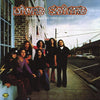
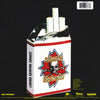
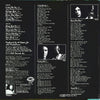
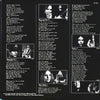
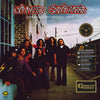
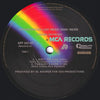
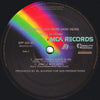
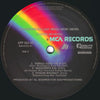
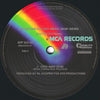
Lynyrd Skynyrd - Pronounced Leh-nerd Skin-nerd (2LP, 45 tours)
ORDER LIMITED TO ONE ITEM PER CUSTOMER
Ronnie Van Zant – lead vocals, lyrics [click here to see more vinyl featuring Ronnie Van Zant]
Gary Rossington – lead guitar (A2–C1, C3); rhythm guitar (A1, C1, D1); slide guitar (D1)
Allen Collins – lead guitar (A1, B2, D1); rhythm guitar (A2, 3, C1-3); acoustic guitar (D1)
Ed King – bass (all tracks except A2 & C1); guitar fills (A2); lead guitar (C2)
Billy Powell – keyboards
Bob Burns – drums (all tracks except A2)
Al Kooper (Roosevelt Gook) – bass (A2, C2); backing vocals (A2); mandolin & bass drum (C2); organ (B2, C3, D1); Mellotron (A2, 8)
Robert Nix – drums (A2)
Bobbye Hall – percussion (B1, C1)
Steve Katz – harmonica (C2)
2 LP, deluxe tip-on gatefold jacket
Limited edition
Original analog Master tape : YES
Heavy Press : 180g
Record color : black
Speed : 45RPM
Size : 12”
Stereo
Studio
Record Press : Quality Record Pressings
Label : Analogue Productions
Original Label : MCA Records
Recorded March 27 – May 1, 1973 at Studio One, Doraville, Georgia, U.S.
Engineered and produced by Al Kooper
Remastered by Ryan Smith at Sterling Sound
Originally released in August 1973
Reissued in April 2022
Tracks :
Side A:
- I Ain't The One
- Tuesday's Gone
Side B:
- Gimme Three Steps
- Simple Man
Side C:
- Things Goin' On
- Mississippi Kid
- Poison Whiskey
Side D:
- Free Bird
Awards:
Rolling Stone 500 Greatest Albums of All Time - Rated 381/500
Hi-fi news : Yearbook 2018 Album Choice
Reviews :
“Now such classics as the riff-rockin' 'Gimme Three Steps,' the power ballad 'Simple Man,' and the, um... immortal (or is that unmercifully deathless?) 'Free Bird' have a previously unheard clarity and depth. No longer do the guitars of Gary Rossington, Allen Collins, and Ed King all run together in a sonic wash. A new level of definition makes Ronnie Van Zant's always surprisingly good vocals even more so... the heavyweight packaging is lush - and the pressing quality, from AP sister company Quality Record Pressings, is excellent... These albums have never sounded better, and it's not much of a leap to say they never will.” Robert Baird, Stereophile, May 2017
"Lynyrd Skynyrd burst onto the national scene with their 1973 debut Pronounced ‘lĕh-‘nérd ‘skin-‘nérd, which not only featured many of the band’s most popular songs but also defined the genre of “Southern Rock” more than any other album. This six-piece group out of Jacksonville, Florida fused blues, country, and straight-forward rock to forge an edge that is totally unpretentious and unassuming. Produced by Al Kooper, there are few debut records which express such confidence and drive, with a balanced diversity between upbeat honky-tonk rock and the delicate jam songs, which would Be the prime templates for the “power ballads” which proliferated a decade or more later.
The grouped was formed nine years earlier, in the summer of 1964. High school friends Ronnie Van Zant, Allen Collins, and Gary Rossington formed a band with two other friends called “The Noble Five”. Through many personnel and name changes in the late 1960s, these three remained the core. In 1970, the band changed their name to “Leonard Skinner” as a tongue-in-cheek tribute to a strict phys-ed teacher at their high school in Jacksonville, who constantly harassed them because of their long hair (which played a big part in Rossington dropping out of school). The more distinctive spelling was adopted at the suggestion of Kooper in 1972 when he signed the band his Sounds of the South, a subsidiary of MCA Records.
The band had grown notoriety by opening for the band Strawberry Alarm Clock and that band’s guitarist Ed King joined Lynyrd Skynyrd to play bass on the debut album (later switching back to guitar, giving the band three guitarists). One day the band was playing a high school prom when their then roadie Billy Powell played what would become the intro piece to “Free Bird”, the band’s most famous song. Powell was immediately invited him to join the band as keyboardist and the classic lineup of Lynyrd Skynyrd was established.
“Freebird”‘s majestic organ intro leads to one of the most famous guitar riffs in rock history, as Rossington used a glass Coricidin bottle for a slide to emulate his hero, the late Duane Allman. The poignant yet melancholy lyrics were written by Collins when he then-girlfriend (and later wife) spoke the opening lines verbatim;
“If I leave here tomorrow, will you still remember me?” The moody ballad gives way to a frantic ending jam led by the dual guitar leads and ever-more creative ways to grind out the three backing chords and even contains a drum roll by Bob Burns that lasts nearly a minute. The song completes the band’s debut album in climatic fashion.
The album begins with some backward percussion effects that introduce “I Ain’t the One”. Although this intro is rather awkward, the song finally catches its groove with the Rossington riff and piano embellishment from Powell, saving the song from bring too ordinary. “Tuesday’s Gone” then provides an immediate contrast to the opener, instantly displaying the band’s range and penchant for differing moods. The great harmonized guitars throughout serenade the lyrical theme of changing times with guest Robert Nix filling in on drums and producer Al Kooper providing bass and Mellotron.
Aside from the later hit “Sweet Home Alabama”, “Gimme Three Steps” may the be the quintessential Southern Rock song for all time. Led by a great riff sequence by Collins and just the right amount of lead guitar activity between verses, the storytelling song became the band’s first charting hit. The lyrics are based on an actual experience by Van Zant in a biker bar in Jacksonville when he had a gun pulled on him. That bar was actually called The Pastime Bar, but was renamed “The Jug” (from the song’s lyrics) in September 2012. “Simple Man” finishes off side one as a rather “simple” song, which somehow stretches three chords for nearly six minutes, using some sonic dynamics which saves it from getting too mundane.
Aside from the closer, side two contains some lesser known yet interesting tunes. “Things Goin’ On” at times seems a bit and unsure of itself, especially due to its lack of a strong beat, but the song contains some very entertaining elements such as the alternating instrumental leads between Rossington and Powell. “Mississippi Kid” is the most unique song on the album while being a definite nod to southern blues. It was constructed by Burns and producer Al Kooper, who also adds the signature mandolin while Ed king plays a respectable slide for his only guitar part on the album. “Poison Whiskey” is a short, funky song with more use of the nice double guitar harmony by Rossington and Collins.
A shortened version of “Free Bird” was released as a single and the full song received heavy airplay for decades to come. After the band’s devastating plane crash, which took the life of Van Zant in 1977, a live version of the song re-charted with even greater success.” Classic Rock Review, January 25, 2013
Ratings :
Discogs : 4.49 / 5 ; Stereophile : Performance 4/5, Sonics 4/5 ;
Hifi news : 95/100 Sound Quality



